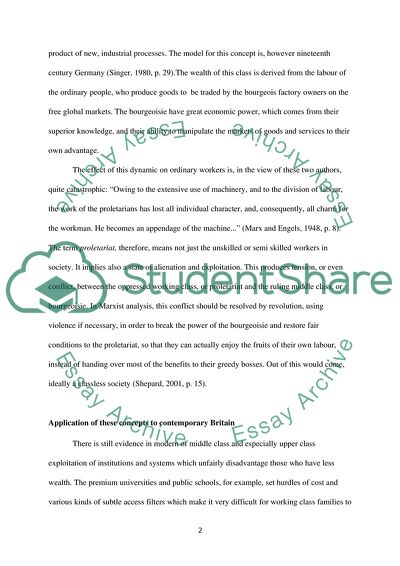
- Home
- Free Samples
- Premium Essays
- Editing Services
- Extra Tools
- Essay Writing Help
- About Us
- Studentshare
- Subjects
- Miscellaneous
- How did Marx and Engels describe social classes and the relationship between them Does their description of social classes have any relevance for understanding contemporary society in Britain Explain your argument
How did Marx and Engels describe social classes and the relationship between them Does their description of social classes have any relevance for understanding contemporary society in Britain Explain your argument - Essay Example
Karl Marx (1818-1883) and Friedrich Engels (1820-1895) are…

- Subject: Miscellaneous
- Type: Essay
- Level: Undergraduate
- Pages: 4 (1000 words)
- Downloads: 0
- Author: caleb80
Extract of sample "How did Marx and Engels describe social classes and the relationship between them Does their description of social classes have any relevance for understanding contemporary society in Britain Explain your argument"
After the preliminary introduction to this document, the first section is entitled “Bourgeois and Proletariat” and the opening salvo in their argument is the statement “The history of all hitherto existing society is the history of class struggles” (Marx and Engels, 1848, p. 3). The present study defines the meaning of these class-related terms as used by Marx and Engels, and then explains why they still have some relevance despite the evident failure of communism as a system across most of the modern world.
There is a basic assumption in the writings of these two authors, that human society is universally structured in a hierarchical fashion, with smaller number of ruling elites at the top, and large numbers of less wealthy and usually exploited workers at the bottom. The terms bourgeois and bourgeoisie are derived from French and they are used to describe a new kind of upper class which is no longer the inherited nobility of the past, but has become a product of new, industrial processes. The model for this concept is, however nineteenth century Germany (Singer, 1980, p. 29).The wealth of this class is derived from the labour of the ordinary people, who produce goods to be traded by the bourgeois factory owners on the free global markets.
The bourgeoisie have great economic power, which comes from their superior knowledge, and their ability to manipulate the markets of goods and services to their own advantage. The effect of this dynamic on ordinary workers is, in the view of these two authors, quite catastrophic: “Owing to the extensive use of machinery, and to the division of labour, the work of the proletarians has lost all individual character, and, consequently, all charm for the workman. He becomes an appendage of the machine.
” (Marx and Engels, 1948, p. 8). The term proletariat, therefore, means not just
...Download file to see next pages Read MoreCHECK THESE SAMPLES OF How did Marx and Engels describe social classes and the relationship between them Does their description of social classes have any relevance for understanding contemporary society in Britain Explain your argument
Marx and Engel, Emile Durkheim and Max Weber
Social Classes and Social Credit
Class inequalities in contemporary Britain
Links between Taste, Consumption and Social Class
How did Max Weber define social class and in what ways did it differ from Marx and Engels approach
Explain Marx's 'general law of capitalist accumulation' and discuss its contemporary relevance
Karl Marxs Social Theory
Is Class Still Relevant in Contemporary Britain

- TERMS & CONDITIONS
- PRIVACY POLICY
- COOKIES POLICY